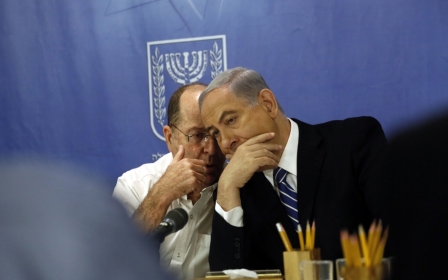No hope for lasting Gaza ceasefire

Jubilation over the Gaza ceasefire is likely to be short-lived, judging by the deal's content, as well as actions and statements since it was agreed. An analysis of its terms reveals the repetition of flaws that doomed previous truces: vague wording, and the postponement of talks on the fundamental issues.
Perhaps these flaws are what led Israeli Prime Minister Benjamin Netanyahu to say following the deal that he "didn't agree to accept any of Hamas' demands". As such, it is puzzling that the Palestinian faction and its allies are celebrating the ceasefire agreement as a victory.
There is no mention of Egypt or Israel ending their blockades, by far the most important Palestinian demand regarding Gaza. Both countries will reportedly open border crossings, but not all of them. That suggests only an easing of the blockades, the extent of which remains unclear. Given their past restrictions and their hostility towards Hamas, it may well be limited, with any easing - no matter how small - portrayed as a major concession.
Nor is there any mention of the wider, fundamental issue of Palestinian statehood. Immediately after the ceasefire took effect though, Israeli deputy minister Ofir Akunis was clear about his country's official position. "No nation gives up on its homeland," and the occupied West Bank "is the cradle of the Jewish homeland," he said, adding: "Returning to the 1967 border would be national suicide."
This echoes Netanyahu's statement in July that "there can't be a situation, under any agreement, in which we relinquish security control of the territory west of the River Jordan". In other words, the West Bank.
"That sentence, quite simply, spells the end to the notion of Netanyahu consenting to the establishment of a Palestinian state," said Times of Israel editor David Horovitz. As such, Israel is completely decoupling Gaza from the wider conflict. No truce can hold under such circumstances.
The Palestinian Authority is expected to take over responsibility for administering Gaza's borders from Hamas, and will lead coordination of the reconstruction effort with international donors. That is only feasible if the Palestinian reconciliation deal remains in effect.
That is a big if, given Israel's vehement opposition to it, its attempts to sabotage it, and the breakdown in trust and coordination between Hamas and the PA during Israel's onslaught in the West Bank and then Gaza. If the reconciliation process is derailed, with the PA having taken over administration of Gaza from Hamas, this could result in a repetition of their open conflict in 2007, much to Israel's delight.
Israel is expected to narrow its buffer zone in Gaza from 300 meters to 100 meters if the truce holds. Even if it does, that still means a buffer zone in Gaza, containing agricultural land, and in which Palestinians are not allowed. Its reduction in size is not a concession. Israel would never accept a buffer zone on its territory, so why should the people of Gaza?
Israel is expected to extend the fishing limit off Gaza's coast to 6 miles (9.6 kilometres) from 3 (4.8 kilometres) miles. This was also stipulated under the previous ceasefire agreement in 2012, but was rescinded by Israel just a few months later.
Before Israeli soldier Gilad Shalit was taken hostage in 2006, Palestinians were allowed to fish 12 miles out, and the Oslo accords - signed in the 1990s - allowed Gaza fishermen up to 20 miles. As such, six miles is in no way a concession - never mind the fact that Israel should not dictate how Gazans use their own waters.
Longer-term issues
As is typical of Gaza ceasefire agreements and the wider Israeli-Palestinian 'peace process', the bigger issues are left until later. That means ample time and opportunity for acts or statements to torpedo the deal.
Among those issues is the release of hundreds of Palestinian prisoners rounded up in the West Bank following the abduction and killing of three teenaged settlers in June. The PA also wants the release of prisoners whom Israel agreed to free earlier this year, but subsequently refused to.
Israel has not said whether will it will release any of them, but since it reneged on a promise to release prisoners while talks were underway with the PA, the odds of this happening anytime soon do not look good.
Even if some are freed, Israel has a habit of re-arrests, and of detaining more Palestinians than it releases. Furthermore, it will likely exact too high a price, such as demanding that the Palestinians drop any attempt to join the International Criminal Court.
Israel wants the return of all body parts and personal effects of its soldiers killed during its onslaught. It is unreasonable to expect that Palestinian fighters were able to keep all such items - let alone thought to do so - while Israel was devastating Gaza by air, land and sea. This may not stop it from viewing an incomplete return as a violation of the ceasefire.
The Palestinians want a seaport built in Gaza, and the airport there - opened in 1998 but closed since 2000 after Israel bombed it - to be rebuilt. Though there have been plans to build a Gaza seaport since the Oslo peace accords, Israel has long rejected this.
In response to Abbas saying he would soon ask the international community to set a deadline for an Israeli withdrawal from the occupied territories, Akunis said last week that the chance of that happening "is similar to the chance that Israel will agree to a seaport and airport in Gaza." In other words, forget about it.
Israel wants the full demilitarization of Gaza, but both Hamas and Islamic Jihad have rejected this. "The weapons of the resistance are sacred and we will not accept that they be on the agenda," said Hamas leader Khaled Meshaal. "The issue is not up for negotiations." Why would any Palestinian faction agree to disarm while the occupation, colonisation and dispossession of their homeland continue unabated?
Given all the aforementioned pitfalls, reaching negotiations would be a major feat in itself. Netanyahu may calculate that it is not in his interest to do so, let alone drag his feet if he agrees to further talks. His public approval ratings were sky high during his onslaught on Gaza, peaking at 82% when the ground invasion began. Since accepting the ceasefire, they have plummeted to just 38%.
The conclusion that he and his political rivals may well draw is that since most of the Israeli electorate favours war, renewing it would be a career boost. Under these circumstances, it seems only a matter of time before further death and destruction are visited on the people of Gaza.
- Sharif Nashashibi is an award-winning journalist and analyst on Arab affairs. He is a regular contributor to Al Arabiya News, Al Jazeera English, The National, and The Middle East magazine. In 2008, he received an award from the International Media Council "for both facilitating and producing consistently balanced reporting" on the Middle East.
The views expressed in this article belong to the author and do not necessarily reflect the editorial policy of Middle East Eye.
Photo credit: A Palestinian boy stares at the debris of destroyed buildings as Palestinians start to return their homes during ceasefire in al-Shaaf neighborhood Gaza City, Gaza on August 31, 2014 (AA)
Middle East Eye propose une couverture et une analyse indépendantes et incomparables du Moyen-Orient, de l’Afrique du Nord et d’autres régions du monde. Pour en savoir plus sur la reprise de ce contenu et les frais qui s’appliquent, veuillez remplir ce formulaire [en anglais]. Pour en savoir plus sur MEE, cliquez ici [en anglais].





